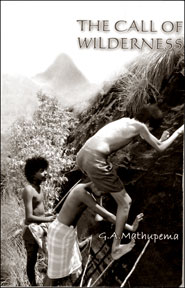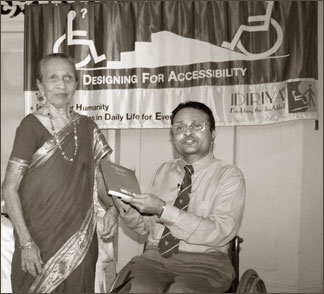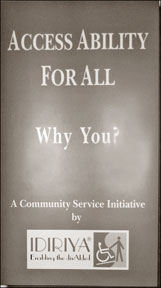|

The spirit of adventure, rekindled
Title: The Call of Wilderness
Author: G. A. Mathupema
Published by Piyasara Publishers, Kalutara
Reviewed by Samangie Wettimuny
[email protected]
 Rarely do we find juvenile novels in Sri Lankan literature which are
rich enough to provide the young readers with knowledge and
entertainment alike. Rarely do we find juvenile novels in Sri Lankan literature which are
rich enough to provide the young readers with knowledge and
entertainment alike.
But G. A. Mathupema who has to his credit about forty books covering
a variety of subjects ranging from fiction, literary criticism and
psychology to philosophy, seems to have succeeded in achieving both,
through his latest juvenile novel, “The Call of Wilderness.”
The story begins with the outbreak of the Second world war and
concludes with the end of it. Sri Lanka was under the Colonial rule of
the British. Though a remote village in Sri Lanka during the period of
war, provides the setting for the novel, readers are always well
informed about the incidents that take place in Colombo.
After the bombing of Colombo by the Japanese, many residents of
Colombo left for the countryside-to the hill country to live with their
relatives in the village. This is how our protagonist, Dingiri Mahattaya
gets to know Sudath, a relatively sophisticated guy from the city.
Sudath aiya is his cousin who comes to stay with them, along with his
mother and father, in order to avoid impending dangers in the city that
arose with the bombing of the Colombo harbour by the Japanese.
Dingiri Mahattaya was a solitary guy until he meets Sudath. There the
writer splendidly builds up the mental condition of a teenager brought
up in a secluded home. He yearns for company which he only gets with the
arrival of Sudath Aiya. The gap between a village boy and a boy from
Colombo is finely portrayed. They play different games.
Sudath is more forward. But they have one thing in common. Both are
innocent and unspoiled though adventurous. Even the jungle boy whom they
get to know later display these common qualities.
As mentioned at the inception, it is important if writers who work on
juvenile novels think on widening the knowledge of readers as well,
while entertaining them.
“The Call of Wilderness” provides a lot of important information
related to the Second World War and how Sri Lanka, though situated
several miles away from the countries who were at war with each other
had to suffer from it simply for being a Colony of Britain.
Since all the information which has a historic value are given, while
narrating an interesting story of which readers never tire, the author
has been able to widen his readers knowledge on the country’s history
however much bitter it may be.
Though the story is woven around two boys who runs away from home
inspired by a spirit of adventure, in addition to the main story there
are several interesting episodes related to the harvesting ceremony,
fine descriptions of Sripada and rituals and stories associated with the
pilgrimage, the origin of several folk tales etc.
First person narration has been used as the mode of presentation.
Dingiri Mahattaya unfolds his story which is full of experiences and
adventures that are quite novel and unfamiliar to the present day
adolescents.
“The children had to creep under the benches, and also they had to
put a stick between their teeth, and plug their ears with cotton wool.”
The opening is so simple and interesting and fills the reader’s mind
with curiosity. “Well, what for?” To appease this he proceeds until he
finishes the entire book.
I could finish the 114 paged novel in a few hours and I assure you
that this is not an exaggeration or an attempt to flatter the author as
he is my favourite teacher. In fact as I started flipping through the
pages of the book, my mind floated back to the past, where I was a
student at his interesting English literature class, the only class
which I attended with great interest during my school days.
There we spent hours and hours attentively, attracted by his vast
knowledge of the subject and his excellent teaching methods.
Since the Japanese had bombed the neighbouring countries by then and
also because Sri Lanka had a strategic importance, the people knew that
an attack on the country was quite likely. The opening paragraph shows
us how the students of that rural school were being advised to follow
the instructions. It is with great care and attention that the head
master gives instructions.
He even tells students to pass the message on to their parents as
well. The unity and the responsible role played by the head master who
‘lived’ in a by gone era should be appreciated. School was the centre of
knowledge and disseminating information.
Also as a precaution to food scarcity students were advised to grow
yams and vegetables in their gardens.
As the students were returning home from school, the soldiers who
were in an army truck which passed by offered them a packet of
cigarettes. Is not this symbolic of many of the bad habits Sri Lankans
got as a result of foreign invasions from which they still could not
escape?
Just like the protagonist, readers too await the harvesting ceremony.
The beautiful festival where human beings blend in well with mother
nature is conducted with simple and ‘innocent’ festivities. Relatives
like Mahara Acchi and Babun Nona visit the place a few days before the
harvesting ceremony to attend to the kitchen chores.
The preparations for the ceremony, the busy harvesting day, how meals
(ambula) are prepared for the workers and on top of that how everyone,
outsiders and family members alike, work create much interest.
This was how the ancient Sinhalese got enough labour to get their
work done. Anyway the villagers could not complete the task peacefully
as they were all disturbed by the unexpected news of the Japanese
bombing Colombo.
It was the family astrologer who revealed that the child is
undergoing a bad period. “Now he is running Rahu’s transit. According to
ancient books on astrology, of course he must run away from home.” This
was exactly what happened later. He ardently desired to join with his
parents on their pilgrimage to Sripada. But just like on previous
occasions this time too the parents left him behind at home.
It was Sudath aiya who arrived from town that gave him enough courage
to go to Sripada on their own. As their journey unfolds readers are
enriched in two ways. First their adventurous story is appealing.
Secondly we get to know a lot of important information about Sripada.
Guneris atha plays a main role in it. There are fine stories behind
everything.
The place or precipice” Nilihela” was named after a woman called Nili
who jumped into the precipice in grief as her son fell into the same
when he walked further towards the edge of it, highly impressed by the
scenery. There are several important factors here which are related to
the place and the rituals associated with it.
As the boys later decide to abandon the pilgrims, they enter into the
jungle. Since they get to know that no one has been able to find where
Divaguha is, an impulse to discover it suddenly strikes both of them.
Their quest for the caves finally ends up with an unexpected encounter.
Ukkuwa and his son Kaluwa are the wonderful genuine friends they meet
in the jungle. The story of a poor man and his son who struggle to eke
out a living through toddy tapping thus unfolds. Nature is their sole
teacher, source of income and the entertainer. In short it is their
life. They have no life without the jungle. That is why Ukkuwa rejects
the offer made by Colombo aunt to take him with them to Colombo to give
him a sound education. “Nona, he does not need any further education,
what he knows is enough for us......I don’t have any trust in your
education. It only corrupts and incapacitates children.”
“The Call of Wilderness” thus comes to an end with the end of the
Second World war. “No more people will die after this. The war is over.”
Anyway we are reminded that so many people in Hiroshima and Nagasaki had
suffered ferocious deaths. The two boys reunite with their parents.
Novels of this nature would be fine to educate adolescents and the
young on the country’s history. When history is presented in the form of
documents readers would get easily bored. But here even without their
knowledge, while enjoying an adventurous story, they get the chance to
learn an ‘important’ chapter of country’s history as well.
Why write poetry
by John Hewitt
 As long as there has been language, there has been poetry. Most of
the earliest surviving texts were written in verse, but the poetic
tradition stretches back to before the days of the written word, when
stories and history were passed down orally using storytellers who used
such devices as meter, rhyme and alliteration to ease the task or
remembering and reciting tales that in many cases took days to tell. As long as there has been language, there has been poetry. Most of
the earliest surviving texts were written in verse, but the poetic
tradition stretches back to before the days of the written word, when
stories and history were passed down orally using storytellers who used
such devices as meter, rhyme and alliteration to ease the task or
remembering and reciting tales that in many cases took days to tell.
Over the years, history has become an academic pursuit rooted far
more in prose than in verse. The age of the epic poem has passed. A book
length poem is an anomaly these days.
Poems tend to be shorter and less structured than in earlier times.
Poetry forms are rarely used and such poetic devices as rhyme and
alliteration have fallen out of favour, especially in the English
Language, which lacks some of the lyrical qualities of languages such as
Italian, Spanish and French.
Poetry, in today’s world is at best a minor niche in the writing
industry. Best selling books of poetry are few and far between. The
major markets are dominated by fiction, self help, political and
business books. Most new books of poetry sell fewer than a thousand
copies and those that reach the tens of thousands are considered highly
successful.
This is a standard that falls far short of the fiction market, for
which you need to sell a half a million books to be considered
successful. Most book publishers don’t even publish poetry anymore.
Those that do so continue to do it mainly out of a love for poetry
rather than an expectation of profits.
Poetry is not, however, without its fans. There is a small but
thriving poetry community. If you live in a city of reasonable size,
chances are that you can find at least one poetry reading happening in a
given week.
There are also poetry festivals and poetry slams (competitive poetry
events) that take place in some communities. The Internet is also a
thriving place for poets, with the blogging format making it easy for
the average person to publish their poetry quickly and easily.
Poetry is not a business. Your chances of making a living as a
professional poet are about the same as your chances of making a living
as a professional chess player. Both are activities that many people
enjoy doing, but very few people want to pay to see. The only difference
is that it is relatively easy to prove whether or not you are a good
chess player, but whether or not you are a good poet is a much more
subjective question.
The point I am getting at, in a very roundabout way, is that the best
reason to write poetry is because it is something you enjoy doing or at
least it is something you get some sort of emotional or spiritual
benefit from doing.
There is no other good reason to write poetry. If you want to be rich
or famous, you’ve come to the wrong field. If you want to express
yourself and join a small but thriving community of people who like to
do the same, poetry is one way to go.
If you love to write poetry, do it. Always try to improve, but don’t
worry about whether you are “good enough” or if you “have what it takes”
because poetry is about the journey far more than the result.
www.knowledgehound.com
‘I love you back’
by Aditha Dissanayake
[email protected]
“I love you back” who said it to whom? Well...who said it, most
recently, to Yours Truly? Barack Obama, of course!
  No, not really. This is how Obama responds to the welcoming roar at
his election meetings and the above is a part of a day dream Yours Truly
has been indulging in, in recent times. When it comes to greetings
political analysts say that Obama’s preference to address a place rather
than a crowd: “Hello, Iowa City.” And “How’s it going, New Hampshire?”
has become a trademark in his oratory. No, not really. This is how Obama responds to the welcoming roar at
his election meetings and the above is a part of a day dream Yours Truly
has been indulging in, in recent times. When it comes to greetings
political analysts say that Obama’s preference to address a place rather
than a crowd: “Hello, Iowa City.” And “How’s it going, New Hampshire?”
has become a trademark in his oratory.
So, what has this got to do with Writer’s Den? Well, the topic today
is greetings and it seems best to have begun the article by picking on
the one person who has the best greeting a public figure has come up
with, in recent times. Especially when compared to Hillary Clinton’s -
heartfelt (perhaps) but not original “I am thrilled to see all of you”.
Can you blame her? No. Not when you realise there is very little left
in salutations these days. Thanks to e-mails which have banished the
tender Dear and substituted it with the too-casual Hi Obama deserves
credit for coming up with his “I-love-you-back”.
History has it that the first short cuts in the English language came
in the form of contractions; won’t, don’t, I’m, you’re - making a
19th-century lexicographer denounce writers “carrying contraction to
such an excess as to make their writings unintelligible to all but the
initiated.” (William Safire in The seamy side of semiotics)
Then had come the period called portmanteau terms, named after the
French suitcase with hinged compartments. Chuckle and snort became
chortle; breakfast and lunch fused into brunch; and, in recent times,
“broadcast and the World Wide Web morphed into webcast”.
Safire believes “electronic communication has whisked us into a third
phase of compression: the Age of Shortspeak. It is not only that the
Dear has been replaced by Hi, but symbolic pictures have taken up the
space used for descriptive words.
“Nowhere is this cheerful short cutting better illustrated than in
the meteoric rise of the emoticon.” Writes Saffer. “The coinage came to
mean “the use of keyboard symbols to draw pictures,” as in - a dash
followed by a closing parenthesis, like -), to stand for “tongue in
cheek.” It was in 1982, that the combination of colon for eyes, dash for
nose and closing parenthesis for mouth viewed sideways to form :-) had
come into existence.
This picture called the “joke maker” at the time has today become the
“smiley”; replacing the sentence “I’m only kidding.” Substitute a
semicolon for the colon and open the parenthesis, like ;-(, and you have
a frownie with a raised eyebrow.
This is it. I have only had time to nibble around the edge of a vast
subject today. Space limits me from making further elaborations.
Perhaps next Sunday...
Till then, HAND! LOL!
‘My anchor in life’s ocean’
Dr. Ajith C. S. Perera, voluntary disability advocate and the beacon
of light behind IDIRIYA promoting ‘Accessible Environments as a Win -
Win approach to Everyone’, presents the First Copy of a Book he has
compiled as a community service initiative to his Mother, Maureen
Johanna Perera. Entitled ‘Access Ability For All - Why You’, this book
was launched during an awareness programme organised by IDIRIYA and held
at Taj Samudra Hotel in Colombo recently.
“It was designed as a consciousness-raising ‘Eye Opener’ to dispel
the hang-ups that continue to surround dis-Ability hindering the
Country’s progress to unlock productive potential of the people”
remarked Dr. Ajith Perera.
Pic: Herbert Perera.
Aspects of Sri Lankan life
The thirty-one stories included in this volume by H. Jagathdeva
present aspects of Sri Lankan life during the past fifty years or so.
Being mainly about the rural middle class, they present a range of
emotions, attitudes and actions that might sometimes appear to be
amusing and at times shocking. These stories deal with a variety of
topics and themes that, it is hoped, will hold the readers’
uninterrupted and wholehearted attention until they have read each story
through to the end.
Even though, the events and descriptions might carry an authentic
flavour, they are all attempts at imaginatively dramatizing the concerns
that have left an indelible impression on the author’s memory during his
quieter youth, and eventful later life as a citizen of Sri Lanka. |
